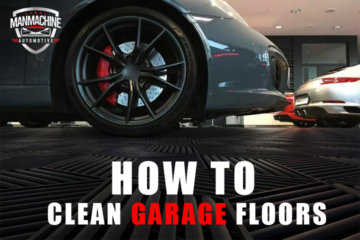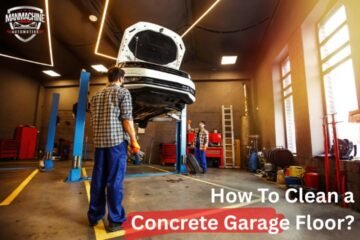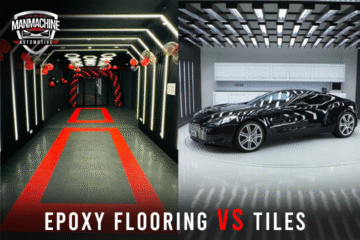When it involves changing a garage from a dull, dusty garage space to a polished and expert region, the floor plays a vital role. Whether you operate your garage as a parking space, DIY initiatives, or maybe the house’s fitness centre, the proper ground can create variations in terms of sturdiness, aesthetics, and preservation. But with so many available options, how do you pick the best garage flooring options?
The most famous challengers are epoxy coatings, interlocking tiles, and garage flooring mats. Each of these best garage flooring options has its strengths and shortcomings. In this comprehensive blog, we are able to evaluate epoxy vs Tiles vs Mats on the subject of installation, durability, aesthetics, protection, safety, and expenses to assist in making a knowledgeable decision.
Why Does the Garage Floor Mean Something?
Your garage floor is one of the most abused surfaces in your home, but it is often the most ignored. From continuous pressure on parked vehicles to the risk of oil spills, dropped equipment, chemical leaks, and excessive temperatures, garage floors can withstand a significant amount of tear on a daily basis. They can withstand a considerable amount of wear. Over time, these factors take a toll on bare concrete, causing cracks, dust buildup, permanent stains, and even structural failures.
While many household owners highlight their concrete floors and think that it is the most practical or affordable alternative, untreated concrete goes on to absorb fluids, trap dirt, and worsen rapidly. Not to mention, the best garage flooring options contribute to a dull, incomplete appearance that reduces the general quality of your space.
Upgrading your garage floor is more than just a cosmetic improvement, as this is a practical investment. Here, it really means:
1. Increases durability and functionality
The best garage flooring options can withstand heavy vehicles, dropped equipment, and daily chemical spills, remaining crack- and chalking-free, whether you use your garage for storage, car repair, or a personal workshop. This ensures improved advanced floor performance and lifespan. It also acts as a barrier that protects the underlying concrete from long-term damage.
2. Increases the resale value of your home
The modern, well-maintained best garage flooring options make your entire house feel more polished and high-end, which can promote the appeal for potential buyers. This indicates that the property has been carefully carried out, even in areas that are often neglected. In today’s competitive housing market, a garage that looks clean and finished can create a strong impression and even increase the resale value of your home.
3. Cleaning and maintenance make it easy
The bare concrete is porous, which means it absorbs everything from engine oil to dirty footprints. This makes it difficult to clean and even challenging to look presentable. On the other hand, epoxy coatings, tiles, and mats form non-porous, sealed surfaces that are against stains and are easy for swiping, mopping, or hosing. Regular maintenance becomes fast and comfortable, which helps you save time and energy.
4. A beauty value and individual style add
Your garage is not a dull, dusty place behind a door. With the right floor, there can be an extension of the interior of your home. From smooth epoxy finish to colourful interlocking tiles, it allows you to customise your garage to reflect your taste. Whether you prefer a showroom-like glow, a sporty checkboard pattern, or a robust industrial vibe, the right floor can dramatically change the space.
5. Improves safety by reducing the slide
Safety is another regularly unseen benefit of the applicable storage floor. A properly designed floor with a slip-resistant garage flooring texture or coating reduces the hazard of slide and fall, especially whilst the floor is moist or clean. It is especially crucial in houses with youngsters, older citizens or the use of the storage as a multifunctional place. In addition, excellent facilitates define floor regions and decrease the dangers of travel from uneven surfaces or exposed cracks.
In short, investing in the best garage flooring options isn’t always pretty much the way it looks, but it’s about the way it works, protects, and performs over the years. Whether you work with DIY projects this weekend, store seasonal items, or just park your vehicle, it has a durable and nicely designed storage floor in a single area for a valuable, safe, and stylish.
Overview of Best Garage Flooring Options
Below you will see the different types of garage flooring.
1. Epoxy floor
Epoxy is a two-part coating system made by combining epoxy resin and a hardener. When used on a concrete surface, it is okay to create a glossy, durable layer that can withstand chemicals, stains, and heavy traffic.
Popular I: Professional garages, exhibition rooms, home garages, and industrial areas.
2. Interlocking tiles
These tiles are made of PVC or polypropylene plastic and merge to create a spontaneous surface. They come in different patterns, textures, and colours and are both functional and decorative.
Popular I: DIY garages, commercial service sections, and hobby workshops.
3. Garage floors
These are pre-formed rolls or tiles made from rubber, vinyl, or polyvinyl. Just roll them on the floor and you are done. They are portable and provide immediate protection.
Popular I: Garage, temporary setup, and budget-conscious users.
Epoxy vs Interlocking Tiles vs Mat Garage Floor Tile Comparison
Here is a brief comparison between epoxy, interlocking tiles and mats.
1. Installation
Epoxy Floor
- Preparation of the proper surface (cleaning, grinding, patching) is required.
- There is a need for many coats: primer, base coat, and topcoat.
- Treatment time: 24-72 hours before use.
- DIY sets are available, but professional installation is recommended.
Advantage – Seamless finish, long-lasting bonds with concrete.
Disadvantage – Work-intensive and time-consuming.
Interlocking Tiles
- DIY friendly.
- No glue or chemicals are required.
- Just pinch them together on the existing floor.
Advantage: Fast installation, easily replaceable.
Disadvantage: This may require cutting for edges or corners.
Garage Floor Mats
- The easy to install garage floors – just uncontrolled and placed.
- There is no need for any work.
- It can be shifted or replaced at any time.
Advantages: No tools or mess work involvement.
Disadvantages: Over time, it can be shifted if not anchored.
2. Durability
Epoxy Floor
- Very resistant to chemicals, oil, stains, and friction.
- It can last 10-20 years with proper care.
- If the underlying concrete shifts, then it might break.
5-star ratings for durability
Interlocking Tiles
- Durable under vehicles and heavy equipment.
- Resistant to cracks and wear.
- Some affordable tiles may fail under excessive heat.
4-star durability ratings
Garage Floor Mats
- Short-term use or a light-duty environment.
- Susceptible to curling and chemical damage with time.
3-star ratings for durability
3. Maintenance
Epoxy Floor
- Easy to sweep and mop.
- Resistant to most spots.
- Requires occasional resealing for longevity.
Maintenance effort: Low
Installation Tiles
- It is easy to clean with light soap and water.
- The tiles can be lifted to clean the bottom.
- Dirt can sometimes accumulate in the seam.
Maintenance effort: Medium
Garage Floor Mats
- It can be swept and hosed down.
- Easily removed for deep cleaning.
- It is prone to staining and even gets moulded if moisture gets into it.
Maintenance trial: Medium
4. Aesthetics
Epoxy Floor
- A high gloss, precisely like a showroom finish.
- Customised best garage flooring options incorporate flakes, metal finishes, and colour.
- The space makes the space look bigger and clean.
Views Appeal: 5-star ratings
Interlocking Tiles
- Available in lively colours, textures, and patterns (diamond plates, coin tops, etc.).
- It’s great to customise the zones or logos.
Views Appeal: 4-star ratings
Garage Floor Mats
- Limited colours and textures.
- Generally looks more utilitarian.
- Edges might get curls, which will affect their visual uniformity.
Views Appeal: 2-star ratings
The Best Use Cases for Each Floor Type
Epoxy is best for:
- Professional garage and workshops
- The homeowner wants a smooth, permanent solution.
- These people need resistance to chemicals and heavy loads.
Interlocking tiles are ideal for:
- DIY enthusiastic
- Rental real estate garage.
- People who like beauty and flexibility
Garage floors are beneficial for:
- Temporary setup or rentals
- Budget-conscious homeowners
- Fast coverage requires at least power.
Table Differentiating Epoxy, Interlocking Tiles and Garage Floor Mats
Here is an easy table that differentiates between epoxy, interlocking tiles and garage floor mats.
| Feature | Epoxy | Interlocking Tiles | Garage Floor Mats |
| Installation | Labour-intensive | DIY-friendly | Plug-and-play |
| Durability | Excellent | Very good | Moderate |
| Maintenance | Low | Moderate | Moderate |
| Aesthetics | Premium look | Customizable | Functional |
| Safety | Needs additives | Textured surfaces | Curling risk |
| Cost | Moderate | High | Low |
Which One Should You Pick Out?
So, which garage ground is fine? The solution relies upon absolutely in your unique requirements, budget and utilisation patterns.
If you need an extended high-performance floor, select an epoxy that appears expert and is proof against almost everything.
If you love flexibility, styles, and the capacity to do your ground without any issues, you can go for interlocking tiles.
If you’ve got a reasonable budget, pick garage mats, require something temporary, or want a no-fuss solution.
Conclusion
The garage floor is not just about aesthetics, but it’s about making your garage functional, safe, and easy to maintain. Whether you treat your garage as a workshop, a showroom, or just a parking lot, selecting the best garage flooring options like those from Manmachine Automotive will make a complete difference.
Invest wisely, think long-term, and customise your choice of how to use space.
FAQS
Q1. Can I use epoxy coatings myself?
Yes, but it’s recommended only if you are skilled. Incorrect surface preparation or mixing can cause peeling and bubbling.
Q2. Are interlocking tiles noisy as you walk?
Some tiles can produce a hollow sound, in particular, if not correctly positioned on a flat surface. Anti-fatigue versions are quieter.
Q3. Which garage-fold traps moisture?
Yes, if the water goes down, it is able to make mould. Regular lifting and cleaning are advised in moist areas.
Q4. Is the epoxy coating suitable for the Indian season?
Absolutely. Epoxy opposes heat, chemicals, and oil. However, ensure that it’s miles professionally installed to address moisture and temperature fluctuations.
Q5. How many times do I have to change garage flooring?
Epoxy: 10-20 years
Tiles: 10-15 years
Matt: 5-7 years



0 Comments